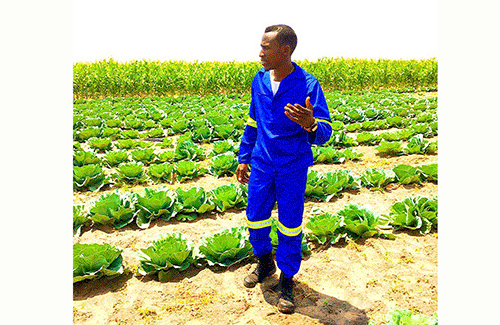The engagement and consultation of Namibian youth is the key to making the transition towards sustainable healthy agriculture and food systems.
Founder of Youth in Agriculture, Ndatulumukwa Haikali said this while delivering a presentation during the United Nations (UN) Food Systems Summit, highlighting the importance of including the youth when it comes to food systems.
The session was held under the theme ‘Fostering sustainable diets, equitable livelihoods and nature positive production in Namibia’. A food system embraces all the elements including environment, people, inputs, processes, infrastructure, institutions, markets and trade, and activities that relate to the production, processing, distribution and marketing, preparation and consumption of food and the outputs of these activities, including socio-economic and environmental outcomes.
He further said when it comes to providing the framework and going forward, it is important to involve the youth in the entire process. “The engagement and leadership of youth in agriculture and food systems is essential, as the youth need to be recognised as agents of change and not only as receivers of assistance/support,” stated Haikali.
Namibian youths have been tapping into subsistence farming and trying their level best to commercialise their produce for profit making, but it has been a bumpy road engulfed by other issues like land availability and other obstacles.
“Due to limited access to land, natural resources, infrastructure, finance, technology, markets, knowledge, and poor working conditions, the sector cannot be considered attractive and sustainable for youth,” Haikali pointed out.
He added that youth participation in decision making related to agriculture and food systems requires changes to the enabling environment through the institution of specific mechanisms to allow the voices of youth to be heard; and recognition of the social, economic, cultural and political status of youth to allow them to fully participate.
Haikali stated that the legislative and institutional environment influences the respect of young people’s rights, working conditions, job creation and youth engagement.
“Coherence between sectoral and employment policies and legislation needs to be promoted to ensure that there are no conflicting objectives in different policies and that policies reinforce one another,” commented Haikali.
He said retaining youth in agriculture also requires improving living standards and quality of services in rural areas and mid-sized towns.
“Traditional subsistence agriculture is not attractive to the youth, and it is thus essential to transform agriculture and food systems in a way that is intellectually challenging and economically rewarding,” expressed Haikali. Next month, the UN will be creating global awareness on land commitment and action that transform food systems to resolve not only hunger, but also reduce diet-related disease and heal
the planet.
- psiririka@nepc.com.na


